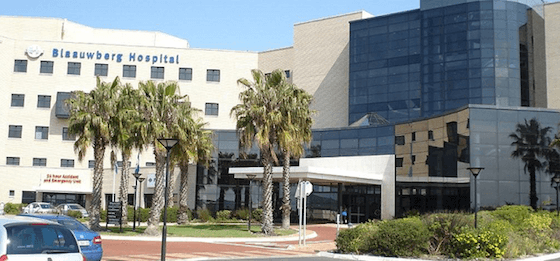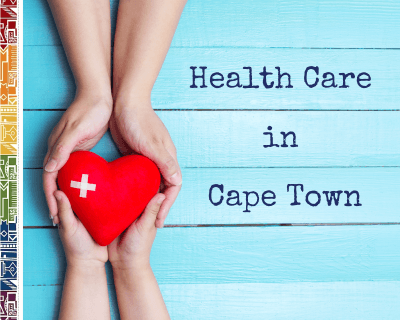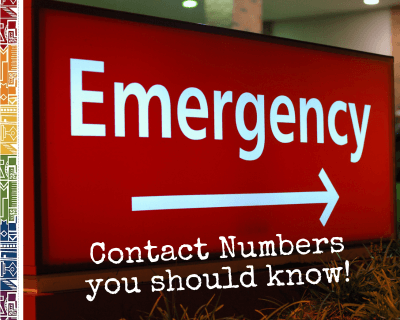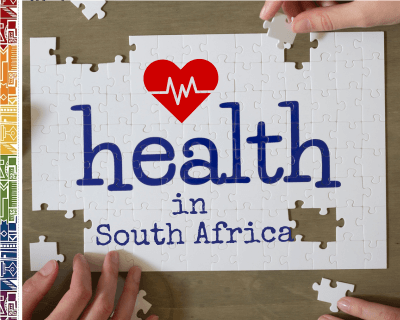Cape Town Health Care
Cape Town health care facilities are efficient and sometimes even first class but on the other hand, some mainly public health care facilities can be shockingly depressing, ineffective and dismal. Be sure to know where to go when you need medical care. This is what you'll find on our Expat Cape Town health page:
 Netcare Blaauwberg Hospital
Netcare Blaauwberg Hospital- Cape Town Ambulance and Medical Emergency Doctors
- Cape Town Health Insurance and Popular Medical Aid Schemes
- Listing of Cape Town hospitals and medical centres
- Private Health Care Costs
- Overview: The South African health care system
- Which vaccinations do I need for my stay in Cape Town?
- Where can I find travel health clinics in Cape Town?
- Where can I find health food stores in Cape Town?
- Cape Town emergency numbers
Cape Town Hospitals and Emergency Care
There are many new or upgraded medical facilities and very efficient private Cape Town hospitals where the standard of care is the same as you would expect from a private hospital in Europe, America or Australia - or even better! Emergency care is swift, caring and efficient, as we have recently experienced after a horrible accident and lengthy stay at one of the private hospitals.
In the local private hospitals you will find all the relevant departments from Maternity to Cardiology and ENT units, Paediatric, General Surgery and Urology. Many of the private hospitals have access to the newest state-of the-art equipment such as MRI and CT scans in adjacent radiology departments and specialist health care professionals who often are internationally trained and experienced as well.
The private Cape Town hospitals all have access to ambulances and well trained emergency staff. Private ambulance teams not only have shorter response times, they also often better equipped and primarily serve the affiliated hospitals. ER 24 is affiliated with Mediclinic while Netcare belongs to Netcare Hospitals. Some area also have fantastic response teams of volunteers and are referred to as Community Medics.
Cape Town Ambulance - Emergency Doctor Services
Private ambulance teams can be reached under these telephone numbers: 084 124 (ER24) and 082 911 (Netcare). Community Medics are in various neighbourhoods, so keep their emergency number stored as well: 087-230-0404. Read more on the various Cape Town hospitals here.
Cape Town Health Care Centres

There are numerous health care centres, private day clinics at the hospitals or medical centers in and around Cape Town. The bigger medical centers also are affiliated with the private hospitals: Intercare and Medicross. Appointments can usually be booked online. The treatment is in general very good and most of the times you can choose your doctor.
If you want to see a specialist straight away and are a cash-paying private patient you usually get you appointment immediately or short notice and do not have to wait for weeks. However, some specialists such as dermatologists or gynaecologists do have long waiting lists and you have to be prepared to wait for a consultation if you are a new patient. It is advised to ring the practise before for an appointment.
Should you be looking for a general practitioner, dentist or specialist who speaks your language I would recommend you call the embassy for their trusted doctors otherwise check the sites of the private hospital groups for doctors affiliated with them. Should you need after-hours emergency medical care, contact your GP or make your way to your nearest private hospital's A&E unit.
Private Health Care Costs
As you have to pay your visits to the doctor or dentist up front, you should clarify beforehand if your insurance will cover and reimburse the fees. To get private treatment in Cape Town you are advised to take out a private health insurance to cover any medical costs and get swift treatment in any hospitalisation. In most of the clinics or hospitals, you can pay either cash, with debit card or credit card for out-patient treatment.
The doctor’s fee for a general consultation amounts usually to around R500 which is comparably low to fees you might have to pay overseas to see a doctor as a private patient. The fees below are only a general guideline:
- GP and Dentist Examination: From R600
- Pediatrician check up: From R650
- Specialist consultation: From R900
- X-ray: From R500
- Bone density scan: From R2,000
- Mammogram: From R2,000
- Emergency Unit/ A&E Fees not including doctor's fees: From R500 (wound care out patient) upwards, depending on triage stage.
- Optometric exam/ eye check: From R500
- Dental implant: From R20,000
- Physiotherapy or Biokineticist/ hour: From R550
- Gym Private Trainer/ hour: From R350
Due to these comparably low prices, health care tourism is booming in Cape Town. Many travellers come here for dental work or aestetic surgery. There are many practices and clinics which offer special packets to visitors from overseas as well, so be sure to enquire and compare, if you intend to go this route.
Cape Town Health Insurance and Medical Aid Schemes
Private health insurance is in South Africa referred to as medical aid. Medical aid cover is mandatory when moving to Cape Town under a long term visa. Today, visa requirement prescribe even a South African medical aid provider as international health care insurance is often a reason for receiving a rejected visa outcome. Thus make sure to choose a local comprehensive medical aid as the public health system is quite basic. You definitely want to protect yourself and your family with either a superior medical aid hospital plan or get an additional private health insurance from your international health insurance provider. Local medical aid schemes often do only cover for medical emergencies and some basic doctor's fees. In general, you will only get limited access to specialist care and have to pay any further medical costs out of your own pocket. Therefore, we highly recommend gap cover, a special medical insurance that provided cover for any excess costs.
Note: Doctors in South Africa, often than not, charge above the normal medical aid compensation for the doctor's fee. Medical aid for example covers only up to 200% of the standard fees a doctor can claim, but if your doctor or specialist charges 400% of the normal fee, you will have a significant shortfall and have to pay this excess from your own pocket. However, should you have an additional gap cover insurance, this additional health insurance will jump in and cover the excess claim. Beware that medical practitioners and specialists can charge for in- and out-of hospital fees 800% of the standard medical scheme rate, so also be careful with choosing your gap cover and make sure it covers the limits you accept or need for your medical care!
There are a variety of medical aid plans, including gap cover, available with different health insurance providers in South Africa. Full medical care plans, including hospital plans, cost around R5,000-R7,000/per month, depending on the hospitals included in the plan. Best enquire directly with these popular health care insurance providers:
- Momentum Health
- Discovery Health
- Bestmed
- Bonitas
- Stratum
- Ambledown Gap Cover
- Turnberry Gap Cover
- Zest Life Gap Cover
Also if moving here be aware that medical aid schemes do apply late joiner fees to people who had no South African medical aid before! This penalty fee can amount to quite extraordinary costs as you can see below. If the new applicant for a South African medical scheme is older than 35 years and has never contributed to a South African medical scheme and the risk pool, a so-called "late-joiner fee" is added to the standard cost of the chosen cover plan. Thus a range of bands apply for all who have not contributed to the South Africa risk pool:
- 1 - 4 years (after age of 35 years): additional 5% monthly contribution on top of the medical aid scheme's cost
- 5 - 14 years (thus 40 - 54 years): additional 15% monthly contribution on top of the medical aid scheme's cost
- 15 - 24 years (55 - 67 years): additional 50% monthly contribution on top of the medical aid scheme's cost
- 25 years or more (68 years and older) and no previous contribution to the risk pool: additional 75% monthly contribution on top of the medical aid scheme's cost
Medical schemes can apply lower fee on their discretion, depending on an applicant’s age and overall health and risk profile at the time of joining but the above mentioned are maximum penalties and are mostly meticulously applied.
Popular Pages
Hospitals in Cape Town |
Health in South Africa |
Like us on Facebook |
Need more info on expat life in Cape Town? Subscribe to our newsletter here:
Image Credit for Cape Town Health Care: Image by DrOdendaal
Read my info about Insurance for Expats here
Return from South Africa Health to ExpatCapeTown Homepage





